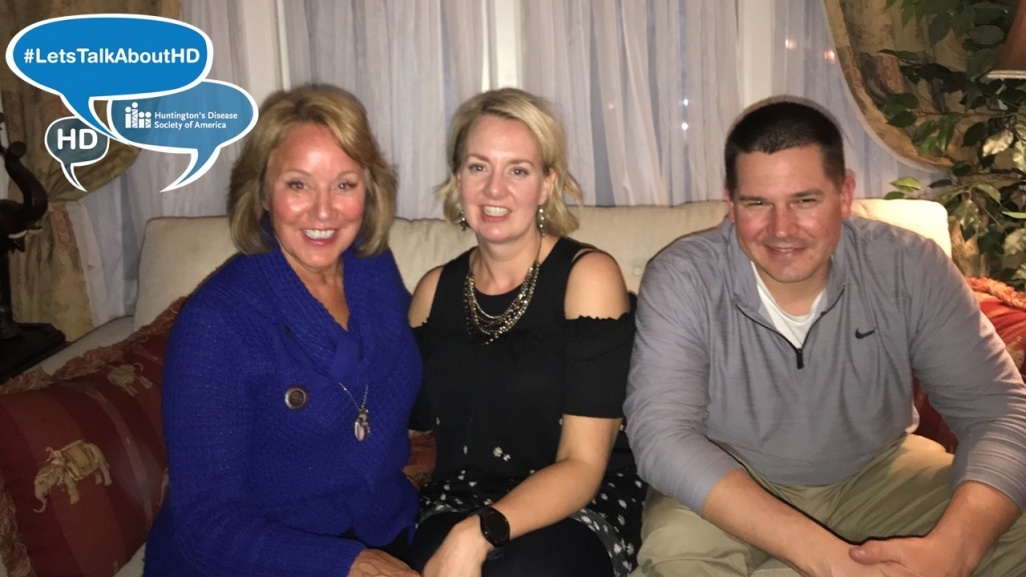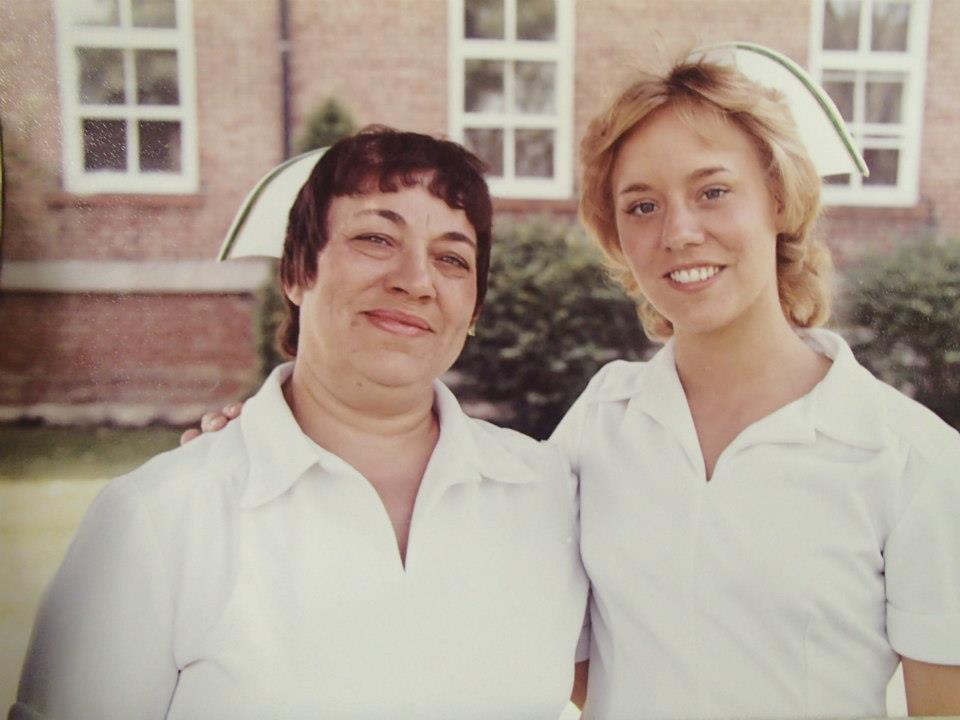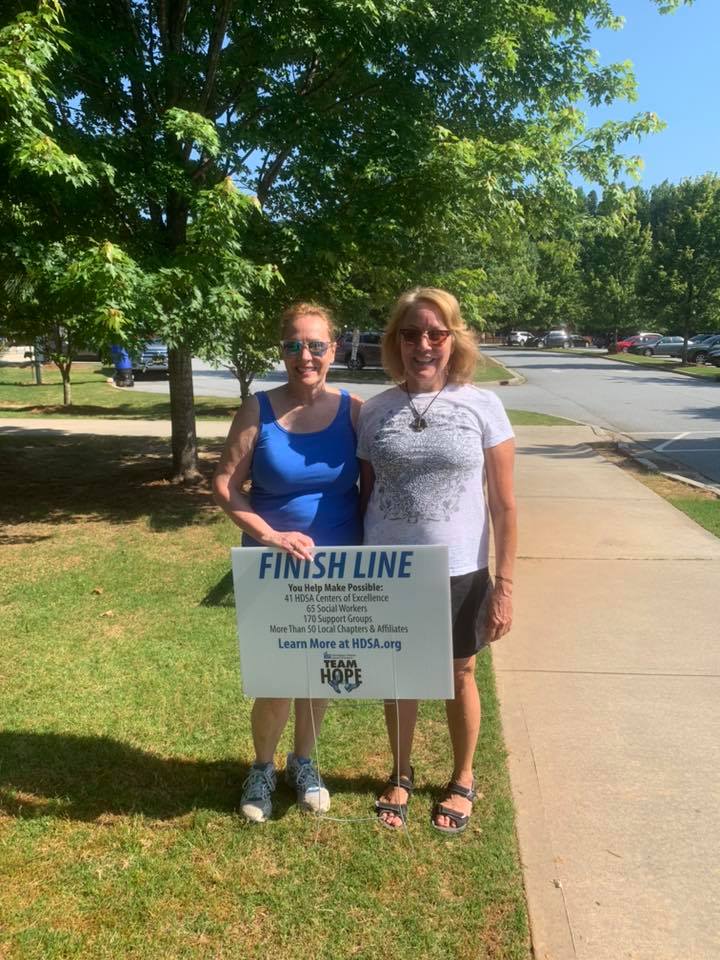
By Matthew Santamaria (msantamaria@hdsa.org)
Illinois resident Donna McCoy was a registered nurse (RN) for more than forty years. Now, she is on the other side. Donna is one of seven siblings at-risk for Huntington’s disease (HD).

HD is a fatal genetic disorder that causes the progressive breakdown of nerve cells in the brain. It deteriorates a person’s physical and mental abilities usually during their prime working years and has no cure. Every child of a parent with HD has a 50/50 chance of inheriting the faulty gene that causes HD.
“We were raised by loving parents and fortunate to remain close with my family,” said Donna. “The HD discussion amongst us is all over the map.”
Before 2018, Donna started to notice changes in her for the past three years. HD is described as having ALS, Parkinson’s and Alzheimer’s diseases – simultaneously. Symptoms include personality changes, mood swings, depression, forgetfulness, impaired judgement, unsteady gait, involuntary movements, slurred speech, difficulty in swallowing, and significant weight loss.
In 2018, her older sister was diagnosed with HD and Donna had a feeling she was next.
“I was relieved because my sister was previously diagnosed as alcoholic dementia and I did not agree with that diagnosis,” Donna explains. “Then, as this news began to settle in, I suddenly thought of my poor mother Angel and my dear grandmother Pearl. I felt sad at their misdiagnosis and inability to understand HD the way my sister and I have.”
Donna decided to get tested for HD. The decision to get genetically tested is difficult to make. Each year, 5-10% are tested. It is never the right or wrong decision to be tested. There are people that see no benefit in knowing that they will develop the disease while others want to know in order to make informed choices about their future. It can take up to several weeks to receive your results from the genetic testing center.
She tested positive and knew she had to tell someone else. Years ago, while she was in school, Donna decided to place her daughter for adoption. Now, Donna wanted to locate her and explain the disease to her. Once Donna located her, she discovered that her daughter was married with two grandchildren.
“The best part of learning about HD was finding her,” said Donna. “She lives not far from me in Illinois, has a professional career on fast track, and I’m a grandma! Her husband is wonderful to me, and my two grandchildren are too young yet to understand adoption, but they look at me sideways and see the similarities. My daughter is HD negative! Meeting her, learning she is not affected; you can imagine how your heart may soar. One of the most challenging years in my life turned into the best.”
Since learning about HD, Donna wanted to spread more awareness because she does not want anyone to be misdiagnosed and wants more people to learn about HD.
“My best friend walked with me at the Atlanta Team Hope Walk and we met several new friends there,” Donna explains. “The whole HD community has been a deep comfort.”

One year after diagnosis, she moved into a handicapped accessible apartment and decided to discontinue her career at the time, Case Manager telecommuter.
“I woke up early couldn’t remember how to boot up my computer,” Donna explains. “I stared at that machine for two hours and beat on the keyboard trying, crying, denying. My life’s work was over. Following this time, I decided to honor my career with an extended weekend on the Gulf of Mexico to enjoy the beach and reflect, meditate. I went out for dinner Saturday evening and there, in my sadness and vulnerability I met Charles.”
Donna fell deeply in love with Charles and are now planning their wedding.
“He has been the warrior- learning with me, accepting me, accepting HD and supporting others too,” said Donna. “The creator saved the best for last for me.”
###
Huntington’s disease is a fatal genetic disorder that causes the progressive breakdown of nerve cells in the brain. It deteriorates a person’s physical and mental abilities usually during their prime working years and has no cure. Every child of a parent with HD has a 50/50 chance of inheriting the faulty gene that causes Huntington’s disease. Today, there are approximately 41,000 symptomatic Americans and 200,000 at-risk of inheriting the disease. In less than 10% of cases, juvenile Huntington’s disease (JHD) affects children & adolescents. JHD usually has a more rapid progression rate than adult onset HD; the earlier the onset, the faster JHD progresses. HD is described as having ALS, Parkinson’s and Alzheimer’s diseases – simultaneously. HD is characterized by a triad of symptoms, including progressive motor dysfunction, behavioral disturbance and cognitive decline.
The Huntington’s Disease Society of America is the premier nonprofit organization dedicated to improving the lives of everyone affected by HD. From community services and education to advocacy and research, HDSA is the world’s leader in providing help for today and hope for tomorrow for people with HD and their families.
To learn more about Huntington’s disease and the work of the Huntington’s Disease Society of America, visit www.HDSA.org or call 1(800)345-HDSA.
This is a story featuring a personal experience with Huntington’s disease. If you would like to have your story told please contact Matthew Santamaria at msantamaria@hdsa.org
Illinois resident Donna McCoy was a registered nurse (RN) for more than forty years. Now, she is on the other side. Donna is one of seven siblings at-risk for Huntington’s disease (HD).

HD is a fatal genetic disorder that causes the progressive breakdown of nerve cells in the brain. It deteriorates a person’s physical and mental abilities usually during their prime working years and has no cure. Every child of a parent with HD has a 50/50 chance of inheriting the faulty gene that causes HD.
“We were raised by loving parents and fortunate to remain close with my family,” said Donna. “The HD discussion amongst us is all over the map.”
Before 2018, Donna started to notice changes in her for the past three years. HD is described as having ALS, Parkinson’s and Alzheimer’s diseases – simultaneously. Symptoms include personality changes, mood swings, depression, forgetfulness, impaired judgement, unsteady gait, involuntary movements, slurred speech, difficulty in swallowing, and significant weight loss.
In 2018, her older sister was diagnosed with HD and Donna had a feeling she was next.
“I was relieved because my sister was previously diagnosed as alcoholic dementia and I did not agree with that diagnosis,” Donna explains. “Then, as this news began to settle in, I suddenly thought of my poor mother Angel and my dear grandmother Pearl. I felt sad at their misdiagnosis and inability to understand HD the way my sister and I have.”
Donna decided to get tested for HD. The decision to get genetically tested is difficult to make. Each year, 5-10% are tested. It is never the right or wrong decision to be tested. There are people that see no benefit in knowing that they will develop the disease while others want to know in order to make informed choices about their future. It can take up to several weeks to receive your results from the genetic testing center.
She tested positive and knew she had to tell someone else. Years ago, while she was in school, Donna decided to place her daughter for adoption. Now, Donna wanted to locate her and explain the disease to her. Once Donna located her, she discovered that her daughter was married with two grandchildren.
“The best part of learning about HD was finding her,” said Donna. “She lives not far from me in Illinois, has a professional career on fast track, and I’m a grandma! Her husband is wonderful to me, and my two grandchildren are too young yet to understand adoption, but they look at me sideways and see the similarities. My daughter is HD negative! Meeting her, learning she is not affected; you can imagine how your heart may soar. One of the most challenging years in my life turned into the best.”
Since learning about HD, Donna wanted to spread more awareness because she does not want anyone to be misdiagnosed and wants more people to learn about HD.
“My best friend walked with me at the Atlanta Team Hope Walk and we met several new friends there,” Donna explains. “The whole HD community has been a deep comfort.”

One year after diagnosis, she moved into a handicapped accessible apartment and decided to discontinue her career at the time, Case Manager telecommuter.
“I woke up early couldn’t remember how to boot up my computer,” Donna explains. “I stared at that machine for two hours and beat on the keyboard trying, crying, denying. My life’s work was over. Following this time, I decided to honor my career with an extended weekend on the Gulf of Mexico to enjoy the beach and reflect, meditate. I went out for dinner Saturday evening and there, in my sadness and vulnerability I met Charles.”
Donna fell deeply in love with Charles and are now planning their wedding.
“He has been the warrior- learning with me, accepting me, accepting HD and supporting others too,” said Donna. “The creator saved the best for last for me.”
Donna has a message for the HD Community:
“Remember to keep learning and offering support to others.”
“Remember to keep learning and offering support to others.”
###
Huntington’s disease is a fatal genetic disorder that causes the progressive breakdown of nerve cells in the brain. It deteriorates a person’s physical and mental abilities usually during their prime working years and has no cure. Every child of a parent with HD has a 50/50 chance of inheriting the faulty gene that causes Huntington’s disease. Today, there are approximately 41,000 symptomatic Americans and 200,000 at-risk of inheriting the disease. In less than 10% of cases, juvenile Huntington’s disease (JHD) affects children & adolescents. JHD usually has a more rapid progression rate than adult onset HD; the earlier the onset, the faster JHD progresses. HD is described as having ALS, Parkinson’s and Alzheimer’s diseases – simultaneously. HD is characterized by a triad of symptoms, including progressive motor dysfunction, behavioral disturbance and cognitive decline.
The Huntington’s Disease Society of America is the premier nonprofit organization dedicated to improving the lives of everyone affected by HD. From community services and education to advocacy and research, HDSA is the world’s leader in providing help for today and hope for tomorrow for people with HD and their families.
To learn more about Huntington’s disease and the work of the Huntington’s Disease Society of America, visit www.HDSA.org or call 1(800)345-HDSA.
This is a story featuring a personal experience with Huntington’s disease. If you would like to have your story told please contact Matthew Santamaria at msantamaria@hdsa.org
